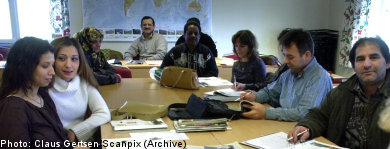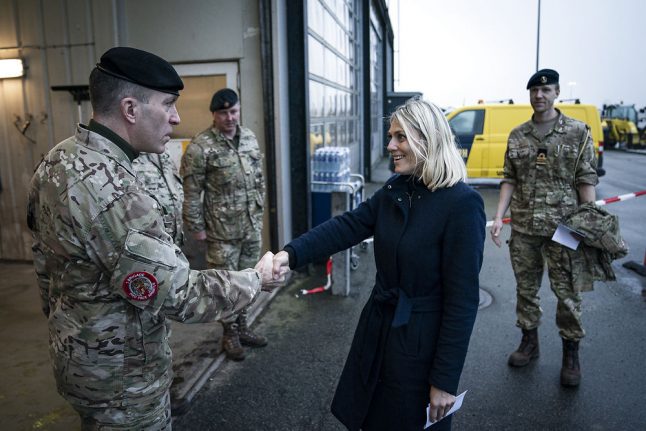“Hello everyone and welcome to Södertälje.” The Arabic interpreter repeats the Swedish spoken to a group of 40 refugees, mostly Iraqi, who have chosen to settle in this small town south of Stockholm.
This is the first step toward their integration into Sweden: after receiving permanent residency status, these men and women are attending the first day of an introductory programme offered by Södertälje municipality.
The class lasts 18 months and its main goal is to get refugees into the job market.
The classroom is packed. Extra chairs are brought in, but there are not enough to go around and some refugees will spend the entire three hours standing up at the back of the room.
“The goal of the programme is for you to become financially independent… Everything will be done so that you can find a job,” says Belhira Kajevic, an employment councillor for the town. The interpreter, a woman from Syria, translates for the group.
The immigrants take notes diligently, many of them still bundled up in heavy winter parkas as the temperature outdoors plunges toward zero.
They are aged between 20 and 60, and the majority of them are men.
Once their language and professional skills are evaluated, the refugees will quickly be signed up for Swedish language classes, vocational training and meetings with advisors.
They will be monitored closely by the municipality throughout the 18 months.
Participation in the programme is not obligatory.
“It’s optional, but I’ve never heard of anyone who has turned down the offer. Many are entirely dependent on the financial aid they get through the programme,” explains Erika Berndt, in charge of the introductory programme.
There are currently 1,500 refugees registered for the classes, for the most part Iraqis. That number is up sharply from a year ago when there were 630 participants.
One of the participants this day is Georgis, who is 25 years old and arrived in Sweden 11 months ago. He is originally from Kirkuk in northern Iraq.
“I was working with the US soldiers … I was threatened. Letters were sent to my family,” he says in good English, his woolly black hat pulled down low over his forehead.
He fled Iraq after his 18-year-old brother was murdered.
“I want to learn to speak Swedish, that’s very important. I’m learning the rules here. I want to know everything about this country. Who knows, maybe I will die here,” he says with a smile.
The second speaker to address the participants is Ginbot Abraha, an Eritrean. He himself came to Sweden as an asylum seeker in 2003.
When he starts explaining how much social aid they will receive from the municipality, worried expressions appear on their faces.
A young pregnant woman raises her hand and asks how much money she will get after her baby is born.
A man says his expenses are already higher than the amount he will be allocated, while another asks about the health care system in the Scandinavian country.
According to Södertälje town officials, 50 percent of refugees are financially independent after two years.
AFP’s Sophie Mongalvy



 Please whitelist us to continue reading.
Please whitelist us to continue reading.